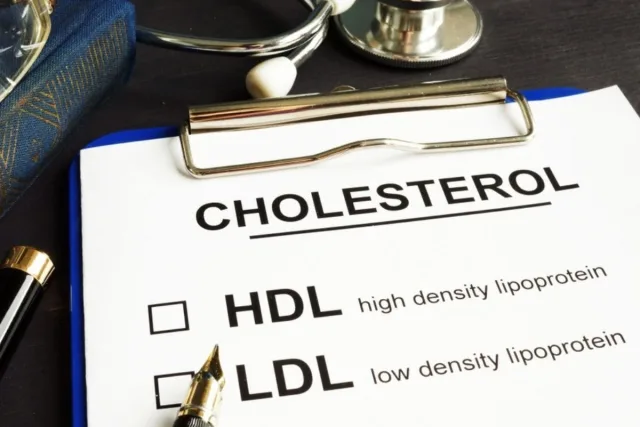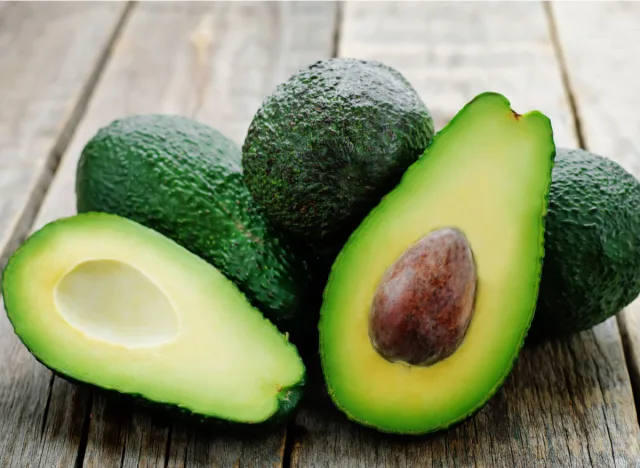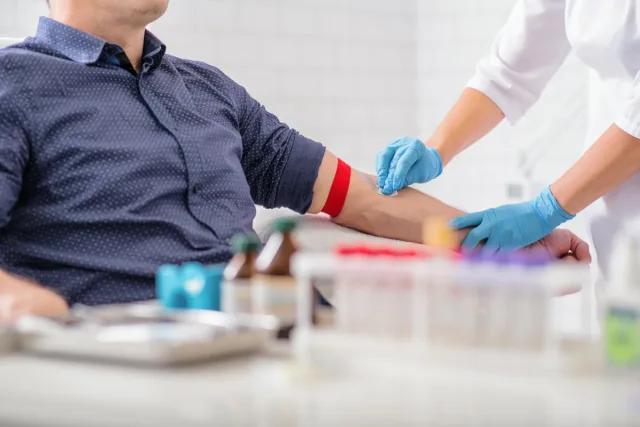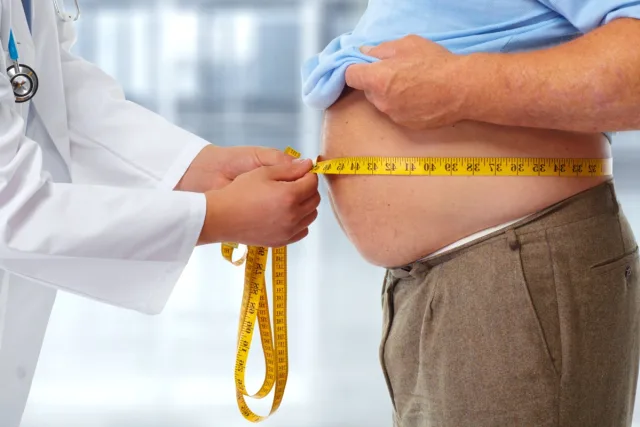Chances are you or someone you know has high cholesterol, but since it usually doesn’t have symptoms it’s not something most people think about, but should. If left untreated, the common condition can cause serious health issues. The Centers for Disease Control and Prevention says, « Having high blood cholesterol raises the risk for heart disease, the leading cause of death, and for stroke, the fifth leading cause of death. » Dr. Ilan Shapiro, FACHE, Chief Health Correspondent and Medical Affairs Officer at AltaMed Health Services in Los Angeles, CA tells us, « To measure cholesterol levels, LDL and HDL triglyceride levels can reveal potential cholesterol deposits around our bodies. Increased amount can cause strokes, aneurysms, and blood flow related problems. » According to the CDC, « Nearly 94 million U.S. adults age 20 or older have total cholesterol levels above 200 mg/dL. Twenty-eight million adults in the United States have total cholesterol levels above 240 mg/dL. » While there are nonmodifiable risk factors like age and family history, there’s still many things people can do to prevent high cholesterol. « Diet does play a part, but it isn’t everything, » Lisa Richards, a nutritionist and author of the Candida Diet tells us. « Genetics will determine how our bodies process cholesterol and therefore whether it is high or low. While genetics play a part, it is still important to follow certain dietary patterns to manage your cholesterol levels. » The only way to know if you have high cholesterol is by a blood test, which is why keeping your annual doctor visit is important. Finding a good primary care physician who will do routine lab work and check for things like high cholesterol is vital for your overall well-being. Eat This, Not That! Health spoke with experts who share what to know about cholesterol and ways to help manage it. As always, please consult your physician for medical advice. Read on—and to ensure your health and the health of others, don’t miss these Sure Signs You’ve Already Had COVID.
1- What to Know About Cholesterol

Dr. Gabriela Rodríguez Ruiz, MD PhD FACS a board-certified bariatric surgeon at VIDA Wellness and Beauty says, « Cholesterol is a waxy substance found naturally in the body and helps with digestion, hormone production, and other vital functions. However, too much cholesterol can increase your risk of developing heart disease, stroke, and other health problems. It is important to maintain a healthy level of cholesterol to stay healthy. There are two types of cholesterol: LDL and HDL. LDL, or « bad » cholesterol, is the type that can increase your risk of developing heart disease if it builds up in your arteries. HDL, or « good » cholesterol, carries excess cholesterol back to the liver, where it can be broken down and removed from the body. » Dr. Eric Berg, a chiropractor who specializes in weight loss through nutritional and natural methods and author of several books, adds, « Cholesterol is not the enemy in your body. It actually serves a purpose, and we need it in order to be healthy. Proper cholesterol levels are vital for things like building our hormones, making vitamin D, and producing bile. There are many benefits of cholesterol. » Dr. Edward Salko is the board-certified physician who reviews lab tests provided by PERSONALABS™ says, « Cholesterol isn’t bad, not at all. In fact, it is a natural fat-like component of all cells in our body and is used in producing essential compounds such as Vitamin D, fat-dissolving bile acids, and sex hormones. Cholesterols are produced by the liver and they can also be acquired from the food we eat. Medical experts have found that high cholesterol is linked to cardiovascular and other critical diseases typically related to aging and fat metabolism, which is why Cholesterol has become associated with a negative connotation. »Dr. Dev Batra Interventional Radiologist, Owner and Founder of Dallas Vein Institute says, « Cholesterol is a type of fat that is found in the bloodstream and made in the liver. It is essential for the body to have cholesterol in order to build healthy cells and keep the blood vessels healthy. But, too much cholesterol can be harmful because it can build up in the arteries and increase the risk of heart disease and stroke. »
Misconceptions About Cholesterol

According to Dr. Batra, « One of the most common misconceptions about cholesterol is that it is only found in foods that are high in fat, such as eggs and red meat. But, cholesterol is also found in foods such as fish, nuts, beans, and avocados. Additionally, some people believe that avoiding cholesterol-rich foods is the only way to maintain healthy cholesterol levels, but that is not true. Eating a balanced diet and exercising regularly can help keep cholesterol levels in check. » Dr. Rodríguez explains, « One of the most common misconceptions about cholesterol is that it is completely bad and should be avoided. While it is true that having too much cholesterol can be damaging to your health, it is important to note that cholesterol plays an important role in the body and is necessary for certain bodily functions. It is not necessary to completely avoid consuming foods with cholesterol, as long as you are mindful of how much you are eating and make sure to get enough exercise. »
2- High Cholesterol Can Show Symptoms at Times

Dr. Shapiro tells us, « When build-up occurs, it can visually show up on your skin, face, and other body parts including internal issues like blood pressure. Without testing cholesterol numbers, the effects are unnoticeable. It’s important to get lab work done to test cholesterol numbers in case they are elevated. » According to Dr. Berg, « High cholesterol typically doesn’t cause any symptoms. In most cases, it only causes emergency events. For instance, a heart attack or stroke can result from the damage caused by high cholesterol.Because high cholesterol doesn’t cause symptoms in the early stages, it’s important to make good lifestyle choices. Eat a healthy diet, maintain an exercise routine, and regularly monitor your cholesterol levels by getting them checked at the doctor’s office. » Dr. Rodríguez says, « High cholesterol typically doesn’t have any noticeable symptoms, so it is important to get your cholesterol checked regularly as part of your routine healthcare. If levels are found to be elevated or borderline high, then lifestyle changes can help bring them back down into the healthy range. However, if left unchecked for a long time, it is possible that damage to your arteries caused by high cholesterol could have already occurred. That’s why it is important to be proactive about monitoring your cholesterol and making healthy lifestyle changes when necessary. No matter what stage you are at, it is never too late to start managing your cholesterol. » Francis Fabrizi Personal Trainer FJF Training adds, « Cholesterol levels can be checked using a simple blood test. High cholesterol is considered to be anything over 200 mg/dL, and when this happens, you may experience symptoms like fatigue, nausea, and headaches. When your cholesterol is over 240 mg/dL, it can start to have a negative effect on your heart health.
Early signs of high cholesterol include:
- Swelling in the lower legs and ankles
- Swelling in the feet or hands
- A feeling of fullness in the legs
- Pain in the calves or thighs
- A burning sensation in your upper abdomen, especially after eating fatty foods. »
3- Risk Factors

Dr. Salko tells us people at risk include, « Those with a poor diet and sedentary lifestyle are at risk of high cholesterol due to diets high in saturated fat and fat metabolism being limited by lack of exercise. Age is also a factor, as the older we get, the less functional our liver becomes leading to lesser cholesterol being excreted from the body. » Dr. Batra says, « The risk of having high cholesterol increases with age, and it is more common in men than women. Additionally, those who are overweight, sedentary, or have a family history of high cholesterol are at a higher risk. Other factors, such as diet and smoking, can also contribute to high cholesterol levels. » Dr. Berg explains, « About 1 in 500 people have genetic high cholesterol, known as familial hypercholesterolemia (FH). I recommend you have a test done to make sure you have it. FH can be identified through genetic testing. If you’ve been diagnosed with FH, you may want to consider having your family members tested, in case you’re just discovering the condition exists in your relatives. When you have high cholesterol because of genetics, it means the receptors in your liver for low-density lipoprotein (LDL) – usually called bad cholesterol – are defective. They aren’t able to receive the LDL cholesterol, break it down, and recycle it like they would if they weren’t affected by genetically high cholesterol. Thus, your LDL levels end up higher than they would if the receptors were functioning normally. »
4- How to Effectively Lower Cholesterol

Dr. Berg shares, « Okay, your genetics cause high cholesterol. What can you do to offset this condition?
Try these simple yet effective remedies:
- Take red yeast extract. Red yeast rice is a traditional Chinese culinary and medicinal product. Some red yeast rice products contain substantial amounts of monacolin K, which is chemically identical to the active ingredient in the cholesterol-lowering drug lovastatin. These products may lower blood cholesterol levels.
- Drink apple cider vinegar with water and lemon. Some studies suggest that apple cider vinegar can lower cholesterol and triglyceride levels.
- Eat at least seven cups of vegetables each day.
- Fast intermittently. Fasting lowers your Fat Storing Hormone, which in turn converts to cholesterol.
- Go on a low-cholesterol diet.
Here’s what you can do to help normalize your cholesterol levels:
- Consume plenty of vegetables (at least 7 cups per day)
- Take bile salts
- Use choline
- Take niacin (vitamin B3) »
Dr. Salko adds, « Limiting factors that trigger high cholesterol is recommended. Quitting smoking, creating a healthy lifestyle and diet, managing stress, and having your cholesterol levels regularly assessed are all steps that should be taken. »
Fabrizi says, « It is possible to reduce high cholesterol. Several ways to do this are:
- Eat more whole grains and less sugary foods.
- Avoid saturated fats and trans fats, which are found in fried foods, packaged snacks, and baked goods.
- Increase your fiber intake by eating more fruits and vegetables, beans, nuts, and whole grains.
- Watch what you drink. Alcoholic beverages have been shown to increase LDL (bad) cholesterol levels while caffeinated drinks can have the opposite effect on HDL (good) cholesterol levels.
- Exercise regularly. Even just 30 minutes a day can help lower your risk of heart disease by reducing stress levels as well as blood pressure and triglyceride levels while increasing good cholesterol levels
While lifestyle changes can help bring down your cholesterol levels over time, sometimes medications need to be used as well, especially if you have existing heart disease or diabetes. »








Leave a Comment
You must be logged in to post a comment.